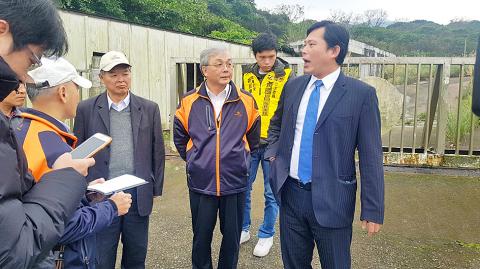New Power Party Executive Chairman Huang Kuo-chang (黃國昌) yesterday said that radioactive metal from an abandoned titanium dioxide plant in New Taipei City was illegally sold to scrapyards in central and southern Taiwan, but the Atomic Energy Council has insisted that it was not radioactive.
Police have found that since Dec. 19, at least four batches of scrap metal were illegally transported from the plant, but so far they have only tracked down one shipment, Huang said on Facebook.
The batch that police located was transported to Taichung’s Liougu (六股) before being sold to scrapyards in New Taipei City’s Taishan District (泰山) and Taoyuan’s Guanyin District (觀音), he said.

Photo: Lin Hsin-han, Taipei Times
The plant, which ceased operations in 1999 and has remained inactive, produced titanium dioxide using radioactive ilmenite.
Huang said that when inspecting the plant earlier yesterday, he learned from Liu Wen-chung (劉文忠), head of the council’s Fuel Cycle and Materials Administration, that Changhua County-based E-Top Metal Co in July 2017 reported finding radioactive scrap metal, but that the council did not test the metal for radiation until Monday.
“For one-and-a-half years, the company did not send the metal to the council’s Institute of Nuclear Energy Research and the council did nothing to track down where it came from,” Huang said.
He said that the council was “irresponsible,” and urged the Executive Yuan to launch an investigation into the matter and discipline the officials involved.
“The council has been unbelievably corrupt. What it did was completely unacceptable,” Huang said.
The missing radioactive scrap metal must be tracked down to protect public health and safety, he added.
On Monday last week, New Taipei City police notified the council that some of the scrap metal at the abandoned plant had been stolen, the council said in a statement.
After inspecting the plant, the council said that it found that some scrap metal had indeed been taken, but that it was not radioactive.
The council said that it reviewed the scrapyards’ recycling records and found that three batches of scrap metal totaling 7.1 tonnes had been sold by the plant from Dec. 21 to Jan. 9, but tests found no radioactivity.
Tests also determined that scrap metal sold by the plant that was previously suspected of being radioactive had actually come from somewhere else, it added.
The council said that it has asked E-Top Metal to follow procedures for handling radioactive metal, but added that it does not have the authority to intervene if the company does not comply by a certain date.
Tests showed that the metal was also not from the abandoned plant, it said, urging the owner of the plant to manage any remaining radioactive metals and waste.
Local police should increase patrols of the abandoned facility and install security cameras on the site, the council said.

DEFENSE: The National Security Bureau promised to expand communication and intelligence cooperation with global partners and enhance its strategic analytical skills China has not only increased military exercises and “gray zone” tactics against Taiwan this year, but also continues to recruit military personnel for espionage, the National Security Bureau (NSB) said yesterday in a report to the Legislative Yuan. The bureau submitted the report ahead of NSB Director-General Tsai Ming-yen’s (蔡明彥) appearance before the Foreign and National Defense Committee today. Last year, the Chinese People’s Liberation Army (PLA) conducted “Joint Sword-2024A and B” military exercises targeting Taiwan and carried out 40 combat readiness patrols, the bureau said. In addition, Chinese military aircraft entered Taiwan’s airspace 3,070 times last year, up about

A magnitude 4.3 earthquake struck eastern Taiwan's Hualien County at 8:31am today, according to the Central Weather Administration (CWA). The epicenter of the temblor was located in Hualien County, about 70.3 kilometers south southwest of Hualien County Hall, at a depth of 23.2km, according to the administration. There were no immediate reports of damage resulting from the quake. The earthquake's intensity, which gauges the actual effect of a temblor, was highest in Taitung County, where it measured 3 on Taiwan's 7-tier intensity scale. The quake also measured an intensity of 2 in Hualien and Nantou counties, the CWA said.

The Overseas Community Affairs Council (OCAC) yesterday announced a fundraising campaign to support survivors of the magnitude 7.7 earthquake that struck Myanmar on March 28, with two prayer events scheduled in Taipei and Taichung later this week. “While initial rescue operations have concluded [in Myanmar], many survivors are now facing increasingly difficult living conditions,” OCAC Minister Hsu Chia-ching (徐佳青) told a news conference in Taipei. The fundraising campaign, which runs through May 31, is focused on supporting the reconstruction of damaged overseas compatriot schools, assisting students from Myanmar in Taiwan, and providing essential items, such as drinking water, food and medical supplies,

New Party Deputy Secretary-General You Chih-pin (游智彬) this morning went to the National Immigration Agency (NIA) to “turn himself in” after being notified that he had failed to provide proof of having renounced his Chinese household registration. He was one of more than 10,000 naturalized Taiwanese citizens from China who were informed by the NIA that their Taiwanese citizenship might be revoked if they fail to provide the proof in three months, people familiar with the matter said. You said he has proof that he had renounced his Chinese household registration and demanded the NIA provide proof that he still had Chinese